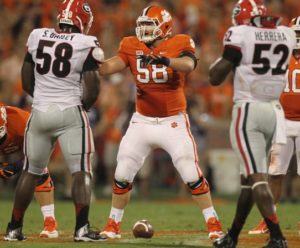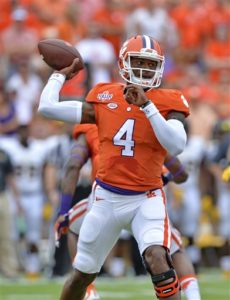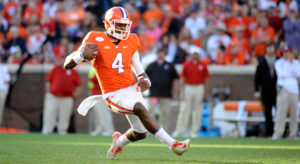
Clemson offensive lineman Ryan Norton calls out coverage prior to a snap against the Georgia Bulldogs. (Photo courtesy Clemson Athletics)
By Frank Gogola | @FrankGogola
Sports Capital Journalism Program
PHOENIX – Ryan Norton, a fifth-year senior offensive lineman for the Clemson Tigers, has seen it more times than he can count.
A pass play is called. The team lines up in shotgun. The ball is snapped. Norton and the other offensive linemen engage their blocks. They’re looking to buy time for quarterback Deshaun Watson, but little do they know Watson has already left the pocket because he saw something he liked and is already 10 yards down the field picking up the first down or scoring a touchdown.
“That happens all the time,” Norton said during Media Day on Saturday.” He’s an unbelievable athlete to be able to do some of the things he does.”
Norton, who has been limited to five games by a knee injury this season, was Clemson’s lone returning starter on the offensive line. For him, it’s still somewhat of a challenge blocking for a mobile quarterback instead of a pocket passer where you know how much ground you have depending on the quarterback’s dropback.
“With Deshaun back there, him being able to move around, it does mess with you a little bit because you’ll be in the middle of blocking, and he’ll run right past you and you don’t know it’s happening,” Norton said. “But at the same time it’s very good because he can avoid a lot of sacks, he can avoid a lot of hits himself and get out of the pocket.”

Clemson Tigers sophomore quarterback Deshaun Watson. (Photo courtesy Clemson Athletics)
Watson’s ability to improvise has been a large reason the sophomore quarterback put together a Heisman finalist season with 3,699 yards and 31 touchdowns through the air and 1,032 yards and 12 touchdowns on the ground. It’s also been key in propelling Clemson to a No. 1 ranking, a 14-0 record and a spot in Monday’s College Football Playoff National Championship.
When Watson and the Tigers take the field against No. 2 Alabama, the offense will be tasked with trying to solve Alabama’s stout defense. The Crimson Tide boast the nation’s best rush defense (70.8 yards per game) and scoring defense (13.4 points per game).
“They’re fast, they’re physical and they’re big,” true freshman left tackle Mitch Hyatt said of Alabama’s defensive line. “They show a lot of tenacity.”
The Crimson Tide have made it a habit of setting up camp in opposing backfields, sacking quarterbacks 50 times, the most among Football Bowl Subdivision teams. Their 3.57 sacks per game is the best by a Saban-coached team since his 1999 Michigan State team averaged 3.73 sacks per game.
So, how do you beat the Alabama pass rush and establish an offensive rhythm? Co-offensive coordinator Tony Elliott said the Tigers need to mix up a little bit of everything: running inside the tackles, bouncing runs outside and throwing the ball. Pace and tempo will help keep the Crimson Tide defense off balance, and screen passes will help neutralize the pass rush. Most importantly, he said the Tigers have to let Watson go out there and be himself.

Clemson quarterback Deshaun Watson (4)delivers a pass against Appalachian State on Sept. 12 in Clemson, South Carolina. (AP Photo | Richard Shiro)
“Man, that’s his natural instincts,” Elliott said of Watson’s ability to improvise. “He’s got a sixth sense. That’s something that you can’t coach. He knows when to pull the ball down and run it. He knows when to sit in the pocket and try to throw it and wait for his receivers to get open. … A lot of that is you try not to over-coach him, but at the same time [you have to] make sure he’s not forcing it. You say, ‘Hey, get into a groove, get comfortable and just go do what you do.’”
To do what he does requires an offensive line willing and able to block for him. His linemen have no shortage of reasons for why they want to protect their quarterback, their friend.
“He’s very respectful to us,” Hyatt said. “He respects what we say. He’ll sit on the bench with us and joke with us, and we’ll mess around on the sideline. He’ll joke around with us on the field here and there, but if it’s a big game he’s focused, he’s locked in [and] he’s serious.”
Added Norton: “He’s the kind of person that he’s nice to everyone. It doesn’t matter who you are [and] it doesn’t matter what role you have on the team, he doesn’t treat you any different.”
Watson’s the same caring guy he has always been, but redshirt senior offensive lineman Eric Mac Lain said the biggest difference from last season to this season is how Watson is taking what defenses give him and not forcing throws or runs.
“He’s so cerebral with his approach,” Mac Lain said. “… He’s in there [the film room] all the time breaking down film for just the little nuances that will give him a little bit of an advantage. It’s pretty special in a young guy like Deshaun.”
Norton said that although Watson has been a relatively calm guy in his two seasons at Clemson, he has seen his quarterback’s calmness and ability to handle his emotions on the field continually improve. Norton mentioned Watson’s comeback from surgery to repair a torn anterior cruciate ligament in his left knee.
Watson’s offensive linemen had high praise for their signal caller’s pocket awareness, those natural instincts Elliott mentioned. Hyatt said Watson isn’t going to take off running at the first hint of a collapsing pocket, adding that he’s able to step up in the pocket or run toward the side of the field to throw the ball before deciding if he needs to run.
“I don’t know how he does it, but he senses it really well,” Hyatt said. “I can’t really explain it. He just knows how to move through the pocket.”

Clemson quarterback Deshaun Watson (4) runs against North Carolina State on Oct. 4, 2014, in Clemson, South Carolina. Clemson won 41-0. (AP Photo | Rainier Ehrhardt)
When Watson does decide to leave the pocket and run, offensive line coach Robbie Caldwell said Watson’s on his own: “We’re just trying to protect him. He’s got good vision, he sees those things. … He’s just an athlete making a play. We just try to keep him from getting hit as much as we can.”
While people associate Watson with terms like dual-threat or running quarterback, Mac Lain said most people don’t know that Watson likes passing the ball more than he likes running it. That arm could become key during the title game if Alabama’s deep front seven takes away running lanes and bottles up Watson and running back Wayne Gallman.
“Everyone kinds of keys him as a mobile quarterback,” Mac Lain said. “At the end of the day, if it came down to it, I think he’s going to rely on his arm more so than he would his feet.”


